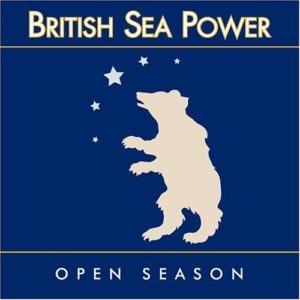British Sea Power Write Elegiac Stanzas For You
by Andy Smith

The subject of cloning, specifically the banning of any human cloning, is an easy target for the self-righteous politician in need of a softball issue to rail against. The sad fact is that they may be too late. Just look at popular music where human cloning has been practiced for decades in the murky depths of recording studios and record company boardrooms.
The boy band/teeny-bopper sex-bomb diva plague is certainly the most noticeable of the past several years, but this phenomenon has infiltrated music on so many levels from hip-hop to metal to indie music that the lack of originality in style, music, and personalities has lead some long-time music aficionados to feel as though they are watching re-runs cast with look-alikes. So this is why British Sea Power is so compelling in this surreal post-modern era where it seems as though time has done a u-turn, and the only new ideas are recycled bits of the past.
Though British Sea Power has drawn tangential comparisons to such artists as David Bowie and Echo and the Bunnymen, the band has a sound and persona all its own. They first rose to prominence in their home base of Brighton with their Club Sea Power nights at a local club, which attracted the attention of Geoff Travis, who signed the band to his re-energized Rough Trade label.
After earning a reputation as a daring and explosive live band who wears World War I gear on stage and plays against a backdrop of tree branches and stuffed birds, the band’s stunning 2003 debut, The Decline of British Sea Power, proved that there was substance behind the unique image. The record was sprawling and ambitious stuffed with lyrical references to Dostoevsky and Macbeth and musically featured everything from jagged blasts of ferocious adrenalin rush (“Apologies to Insect Life,” “Favours in the Beetroot Fields,” and the stellar single “Remember Me”) to sublime majestic melodies (“Carrion,” “The Lonely,” and the brilliant “Fear of Drowning”) capped the thirteen minute epic “Lately.” Despite the fact that literary, intellectualized independent rock music from the UK generally has no US commercial appeal, the record and band were just too damn good to be ignored.
But after countless shows where the band literally risked physical injury every night, they wisely retreated to a bucolic setting to write and record their second record. “We toured for two years which was amazing but physically taxing. At one point two of the members were on crutches, ” explained guitarist Noble during a stop on their recently completed US tour, the band’s third. “So we rented a barn in the countryside to create a relaxing mood in which to write.”
The results of those days and nights in the barn can be found on Open Season, which was released in April and entered the UK album charts at #13. The record has received varied reviews (some thoroughly glowing, and some apathetic) in both the British and American press, but it stands as a fine companion to its predecessor. If listeners were looking for a repeat of Decline‘s power and intensity, they will be disappointed; Open Season is much more subdued both musically and emotionally. The new record is also a much more cohesive set of songs, less sprawling and more focused, and it gets better with repeated listens. Lyrically, British Sea Power may get off on obscure references and esoteric language, but they also are unafraid of exploring complex emotional territory and in that respect, evoke the massive sound and uplifting content of Big Country’s first two records; hopefully they will have a happier ending to their story than that once great band did.

Open Season starts off with “It Ended On an Oily Stage,” the first single (which also entered the UK charts in the top 20), and a song that ranks as one of the band’s best. The song is built around a nearly perfect repeated guitar riff from Noble, who continues to be one of the most astonishingly tasteful guitar players to come along in years. Then Yan’s vocals come in with the lyrics: “Everything you said was true/ Everything you did was you/ Everything I started with her/
Ended on an oily stage where/ I wrote elegiac stanzas for you/ I hope and pray that they come true” before the song builds into a chorus both uplifting and thoroughly aching.
Track two, “Be Gone,” essentially picks up where “Oily Stage” leaves off, but “How Will I Ever Find My Way Home,” introduces bassist Hamilton on lead vocals. His only vocal turn on Decline, “Blackout,” was arguably the weakest song on that record, but on “How Will I Ever Find My Way Home,” Hamilton is much more assured as a singer, and the song provides a toe-tapping contrast to “Oily Stage” and “Be Gone.” This is the first of three songs Hamilton sings on Open Season, which is evidence of his growth as a songwriter in the shadow of his brother Yan. Where his songs have previously been primarily used as B-sides, these three have prominent spots on the record; the other two being the album closers “The Land Beyond” and “True Adventures.”
The five cuts at the heart of the record emphasize the peaceful, almost breezy mood that predominates Open Season. “Like A Honeycomb” is a pleasant, wistful tune with a dynamic chorus. “Please Stand Up” is the second single and reminiscent of Decline‘s “Carrion” with another of Noble’s mammoth guitar lines leading into a subdued verse before it explodes into an almost triumphant chorus. (Incidentally, American MTV has reportedly banned the video for the song because of the lines “And then all of the sudden it’s all better better/ A little excitement makes us wetter wetter.” It would almost make you laugh if it wasn’t so pathetic).
Next comes “North Hanging Rock,” which starts off as the record’s quietest moment before gradually building to a crescendo. As for the sounds of rocks crunching under foot and the birds singing in the background at the start of the song, those are real. Yan did the vocal tracks outside in the courtyard of the studio in Wales where Open Season was recorded, and the sound of crunching rocks is his footsteps as he walks to the microphone. Incidentally, a number of drum tracks were also recorded outside with a group of stabled horses as an audience. “To Go To Sleep” and “Victorian Ice” finish out the middle five. Both are written in major keys which makes them brighter affairs with “To Go To Sleep” building up into quite a rocking song before it cuts off, and “Victorian Ice” jauntily pushed along by another catchy guitar riff.
The last three songs of the record cap it off in grand style. “Oh Larsen B” finds Yan singing an ode to the Larsen B Antarctic ice shelf: “You had twelve thousand years/And now it’s all over/Five hundred billion tonnes of the purest pack ice and snow/Oh Larsen B, oh won’t you fall on me?/Oh Larsen B, desalinate the barren sea.” The last two minutes of the song build beautifully into a dynamic ending, starting from a bass and drum breakdown that slowly gathers steam as Noble drops lovely single note harmonics on top. “The Land Beyond” features Hamilton singing a tale that could be about death or just a simple venture into unknown and uncharted territory.
The closer, “True Adventures” is Open Season‘s epic at just under eight minutes. It is less sweeping and subsequently less messy that “Lately,” Decline‘s magnum opus, but it is still the record’s grandest moment. According to Noble, the song came about after a heavy storm had struck the barn where they were writing, and Wood, the band’s drummer, set out to recreate the sound of the storm on his drum kit. Sure enough, the song opens with a rumble of thunder before the crash of first the drums and then other instruments. Then the music settles into a lovely hushed melody and gentle lyrics that suit Hamilton’s fragile, high-pitched voice perfectly before collapsing into more instrumental chaos and then back to the melody again in a pattern reminiscent of the Byrds “Eight Miles High.” The song ends Open Season in a satisfied mood evocative of an emerging sunset after a powerful storm.
If The Decline of British Sea Power was a sweeping gale of record with wild swings in energy and emotion, Open Season is more grounded and earthy, which is a product of not only the environs where it was created but also in the band’s refusal to do anything but follow its own path. “We wear our hearts on our sleeves,” says Noble matter-of-factly, which leads you believe that the band’s forays into literary themes and attempts to recreate the sounds of nature in music are not acts of pretense but genuinely sincere expressions of their artistic perspective. But fans who might mourn the loss of the band’s harder-edged material need not worry. Noble says, “We wrote some spiky songs as well, but they didn’t fit the mood of the record, so we may put them out on an EP or even save them for the next record.”
When viewed in terms of the newest wave of the British Invasion that includes the post-punk, dance-club ready bands like Franz Ferdinand, The Futureheads, Bloc Party, Kaiser Chiefs, and others, British Sea Power doesn’t really fit in. But that is just fine with the band whose rural roots (only Noble is from a major city, Leeds; Wood, Yan, and Hamilton are from rural Cumbria in the northwest of England near the Lake District, while keyboardist/percussionist Eamon is from Gloucestershire in the west) are reflected in both their music and desire to avoid the often London-centric attitudes of the British music press. “We never wanted to move to London. London bands have a reputation for being cool, but we’re quite awkward and don’t like to fit in with everyone else,” explains Noble.
Their recent American tour included a stop at the Coachella Festival in California, where the band played to a significantly larger crowd than at their club shows, but reports from both Coachella and various smaller venues were unanimous in their effusive praise for the band’s live show both in terms of energy and musicianship. Indeed a number of people who saw them in Austin and had been underwhelmed by Open Season came away with a different view of the band.
Despite their surging popularity in the UK, British Sea Power still prefers to play in smaller out-of-the-way locations and non-rock events. Noble says that the band likes it that way, “In towns with less of a musical heritage, the crowds tend to react differently. Crowds in places with more of a heritage tend to be more critical, while in places where not a lot of bands play, they are just glad to see a band and become more enthusiastic.” In addition to appearances later this summer at the massive Glastonbury, Reading, and Leeds festivals, their first public appearance upon their return from their US tour was at the Chelsea Flower Show, one of the biggest gardening festivals in the world. For so many bands, this would seem to be incongruous, but with British Sea Power, it seems to work.
After two records that have set quite a standard, British Sea Power’s next test will be to find new musical horizons, but there doesn’t seem to be much of a chance of the band doing anything but following its singular muse. Perhaps in the meantime we’ll get to see if newer bands try to clone what BSP is doing, and stages around the world will become covered in tree branches, while earnest young men write songs with dictionaries and encyclopedias at their sides. Sounds better than blow-dried boy bands, doesn’t it?

Leave a Reply